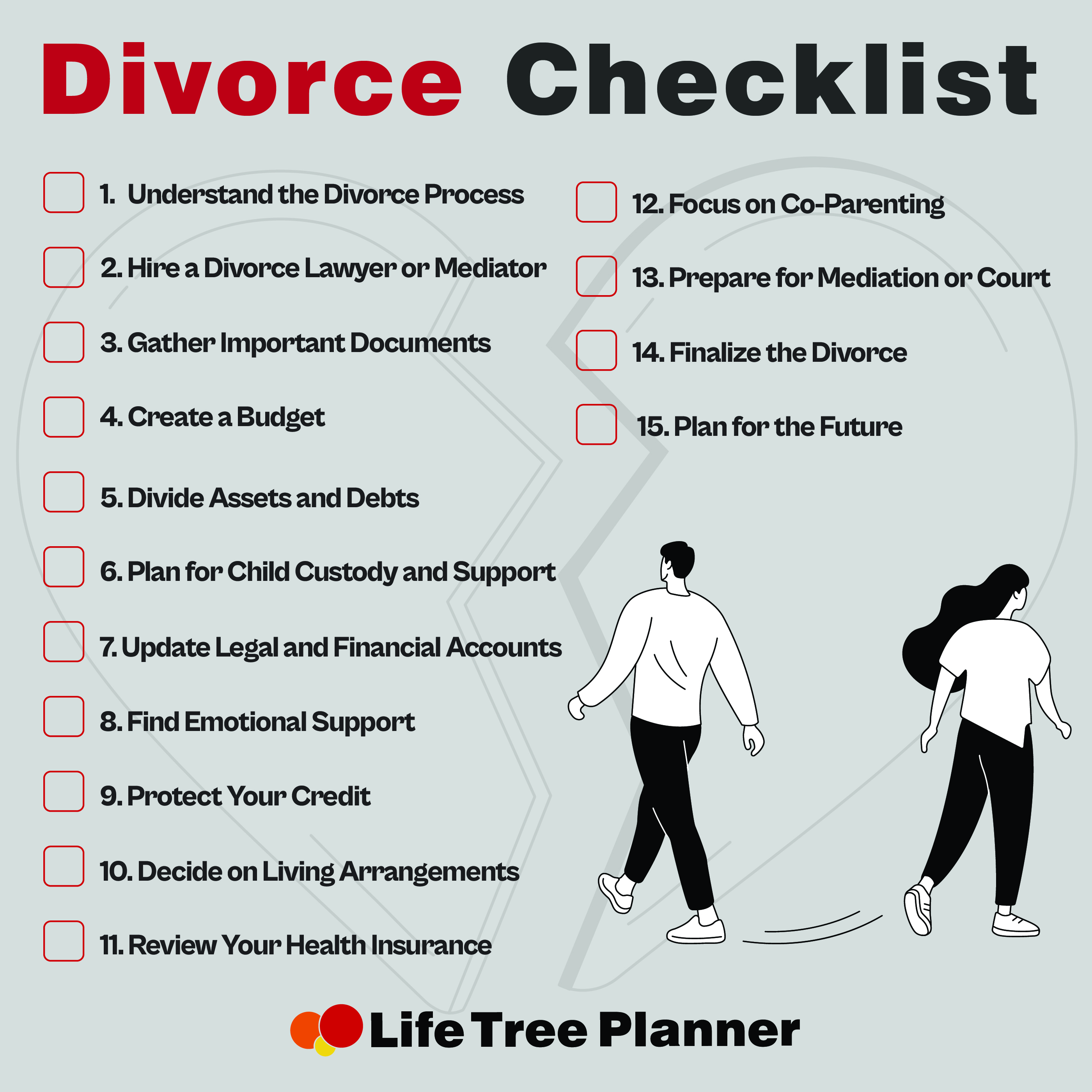
Are you feeling overwhelmed by the complexities of divorce and unsure where to start? Navigating this emotional and legal journey can be challenging, but you don’t have to do it alone.
As someone seeking clarity and control during this difficult time, you are the hero of this story, and it’s your strength and resilience that will guide you through.
In this article, we’ll act as your trusted guide, offering a step-by-step Divorce Checklist and exploring 15 essential checklist items.
By following this comprehensive plan, you can move forward and gain confidence, reduce stress, and focus on rebuilding your life.
Let’s get started on this path to a well-prepared and empowered future.
- What is a Divorce Checklist?
- Why You Need a Divorce Checklist?
- 15 Essential Items to Consider
- 1. Understand the Divorce Process
- 2. Hire a Divorce Lawyer or Mediator
- 3. Gather Important Documents
- 4. Create a Budget
- 5. Divide Assets and Debts
- 6. Plan for Child Custody and Support
- 7. Update Legal and Financial Accounts
- 8. Find Emotional Support
- 9. Protect Your Credit
- 10. Decide on Living Arrangements
- 11. Review Your Health Insurance
- 12. Focus on Co-Parenting
- 13. Prepare for Mediation or Court
- 14. Finalize the Divorce
- 15. Plan for the Future
- Tips for Navigating the Divorce Process
- Common Challenges in Divorce
- Divorce Checklist: A Recap
Here are 15 essential steps for a divorce checklist:

1. Understand the Divorce Process: Learn the legal steps and requirements in your state.
2. Hire a Divorce Lawyer or Mediator: Choose a professional to guide you through the process and protect your interests.
3. Gather Important Documents: Collect financial records, legal papers, and personal documents.
4. Create a Budget: Plan for your post-divorce finances, including legal fees and living expenses.
5. Divide Assets and Debts: List shared property and liabilities to split fairly.
6. Plan for Child Custody and Support: Focus on the best arrangement for your children’s needs.
7. Update Legal and Financial Accounts: Remove your spouse from accounts and update essential documents.
8. Find Emotional Support: Lean on friends, family, or a therapist to manage stress.
9. Protect Your Credit: Monitor your credit report and open independent accounts.
10. Decide on Living Arrangements: Determine who keeps the home or if both need to move.
11. Review Your Health Insurance: Arrange new coverage if your current plan changes.
12. Focus on Co-Parenting: Work together respectfully to support your children.
13. Prepare for Mediation or Court: Stay organized and bring the necessary documents for negotiations.
14. Finalize the Divorce: Review the decree to ensure all agreements are correct.
15. Plan for the Future: Set new goals and routines for your independent life.
See also Christmas Checklist: 8 Essential Items for a Stress-Free Holiday
What is a Divorce Checklist?
A divorce checklist is a guide to help organize your divorce process. It ensures you address legal, financial, and emotional matters. Start by gathering important documents like your marriage license, bank statements, and retirement accounts.
Include child custody and child support considerations if you have children. Don’t forget to list personal property and shared assets for division. Spousal support and family law attorneys should also be on your checklist.
A good divorce checklist simplifies divorce proceedings and reduces stress. Use it to track everything, from financial planning to decisions about child custody. This helps avoid overlooked details. Whether it’s managing bank accounts or dividing property, a checklist ensures you’re prepared for every step of the process.
Why You Need a Divorce Checklist?
A divorce checklist is essential for staying organized during a stressful time. It helps manage stress by breaking the process into clear steps. Start by gathering important documents like your marriage certificate, prenuptial agreements, loan documents, and divorce papers.
Understanding legal custody and spousal support is crucial. Work with legal representation experienced in family law for guidance. Update powers of attorney and review your bank accounts.
A checklist ensures nothing is overlooked during legal proceedings. It also supports an amicable divorce by clarifying each step. Manage your finances and organize assets effectively. With a divorce checklist, you can navigate the process with confidence and focus on rebuilding your future.
15 Essential Items to Consider
1. Understand the Divorce Process

The divorce process varies by state or country. Research the rules where you live to understand your options.
- Determine if your divorce will be contested or uncontested.
- Learn about residency requirements and filing fees.
- Consult a lawyer to understand your rights and responsibilities.
2. Hire a Divorce Lawyer or Mediator

Legal professionals can help protect your interests. Choose one that aligns with your needs.
- For contested divorces, hire an experienced divorce attorney.
- Consider mediation if you and your spouse agree on most terms.
- Research and compare lawyers’ fees and reviews before hiring.
3. Gather Important Documents
Organizing documents is crucial for dividing assets and settling debts.
- Collect financial records like bank statements, tax returns, and pay stubs.
- Gather proof of ownership for assets, including cars and homes.
- Keep copies of marriage certificates, prenups, and other legal documents.
4. Create a Budget

Divorce often impacts finances and needs money management. Prepare for changes by creating a detailed budget.
- List monthly expenses, including housing, food, and utilities.
- Identify potential changes in income or additional legal fees.
- Plan for unexpected costs, like moving or setting up a new household.
See also Vision Board for Couples: 5 Creative Ideas to Strengthen Your Bond
5. Divide Assets and Debts

Fairly dividing property and liabilities is a key part of divorce.
- Make a list of shared assets, like real estate, vehicles, and savings accounts.
- Include debts, such as credit cards, loans, and mortgages.
- Work with your lawyer to ensure an equitable division.
6. Plan for Child Custody and Support
If children are involved, their needs should come first.
- Decide on a custody arrangement that works for both parents.
- Discuss visitation schedules, holidays, and special events.
- Ensure child support is calculated fairly based on income and needs.
7. Update Legal and Financial Accounts

Divorce requires changes to legal documents and accounts.
- Update your will and estate plan to reflect new beneficiaries.
- Remove your spouse from joint accounts or credit cards.
- Change passwords for online banking, utilities, and social media.
8. Find Emotional Support

Divorce can take a toll on your mental health. Lean on trusted people and resources.
- Talk to friends or family who understand and support you.
- Join a support group for people going through divorce.
- Consider therapy to help process emotions and plan for the future.
9. Protect Your Credit

Your credit score can be impacted by joint debts and accounts.
- Monitor your credit report regularly for changes or errors.
- Pay off joint debts if possible before closing shared accounts.
- Open new accounts in your name to establish independent credit.
10. Decide on Living Arrangements

Your home situation may change after a divorce. Plan for your new living arrangements early.
- Decide if you or your spouse will keep the marital home.
- Look for a new place if you’re moving out.
- Discuss custody arrangements if children are involved.
11. Review Your Health Insurance

Divorce can affect your health coverage, especially if you’re on your spouse’s plan.
- Check if you’ll need to find new insurance through work or a marketplace.
- Research COBRA coverage if you need temporary health insurance.
- Update beneficiaries on health and life insurance policies.
12. Focus on Co-Parenting

If you share children, prioritize their well-being through effective co-parenting.
- Keep communication respectful and focused on the children’s needs.
- Use a shared calendar to track schedules, appointments, and events.
- Avoid involving children in conflicts or legal matters.
13. Prepare for Mediation or Court
If you can’t reach agreement, a mediator or judge may decide.
- Gather evidence and documents to support your case.
- Work with your lawyer to present your position clearly.
- Stay calm and focused during negotiations or court hearings.
14. Finalize the Divorce
Once agreements are made, it’s time to finalize the process.
- Review the divorce decree carefully with your lawyer.
- Ensure all terms are clear, including custody, finances, and property division.
- Sign the necessary paperwork to make the divorce official.
15. Plan for the Future

Moving on after divorce requires setting new goals and routines.
- Create a financial plan for your post-divorce life.
- Explore new hobbies or activities to rediscover your interests.
- Focus on self-care and rebuilding your confidence.
Tips for Navigating the Divorce Process
- Stay Organized: Keep all documents in a folder for easy access.
- Be Patient: Divorce can take time, so remain patient and focused.
- Communicate Clearly: If possible, keep communication with your spouse civil.
- Seek Professional Help: Lean on experts like therapists and lawyers.
- Take Breaks: Allow yourself moments to rest and recharge.
Common Challenges in Divorce
- Emotional Stress: The end of a marriage can bring sadness, anger, and uncertainty.
- Financial Strain: Dividing assets and debts can create financial challenges.
- Co-Parenting Conflicts: Adjusting to shared parenting roles can be tough.
- Legal Complexities: Understanding your rights and obligations can feel overwhelming.
- Social Adjustments: Friendships and family dynamics may change after a divorce.
See also Couple Relationship Goals: 20 Ideas for a Stronger Bond
Divorce Checklist: A Recap

Finishing your divorce checklist is key to a smoother process. Start by focusing on financial planning. Update your bank accounts and set up an emergency fund. Gather essential documents like your marriage certificate, medical bills, and account statements. Address child custody and child support with clear agreements.
Family law attorneys can guide you through divorce proceedings and help secure fair spousal support. Legal representation ensures your interests are protected. A pre-divorce checklist helps you organize critical tasks and avoid mistakes. Remember to update beneficiaries on financial accounts.
Managing these details will help you stay on track during this challenging time. Proper preparation leads to better decisions and a stable future post-divorce. Stay focused, organized, and proactive.


